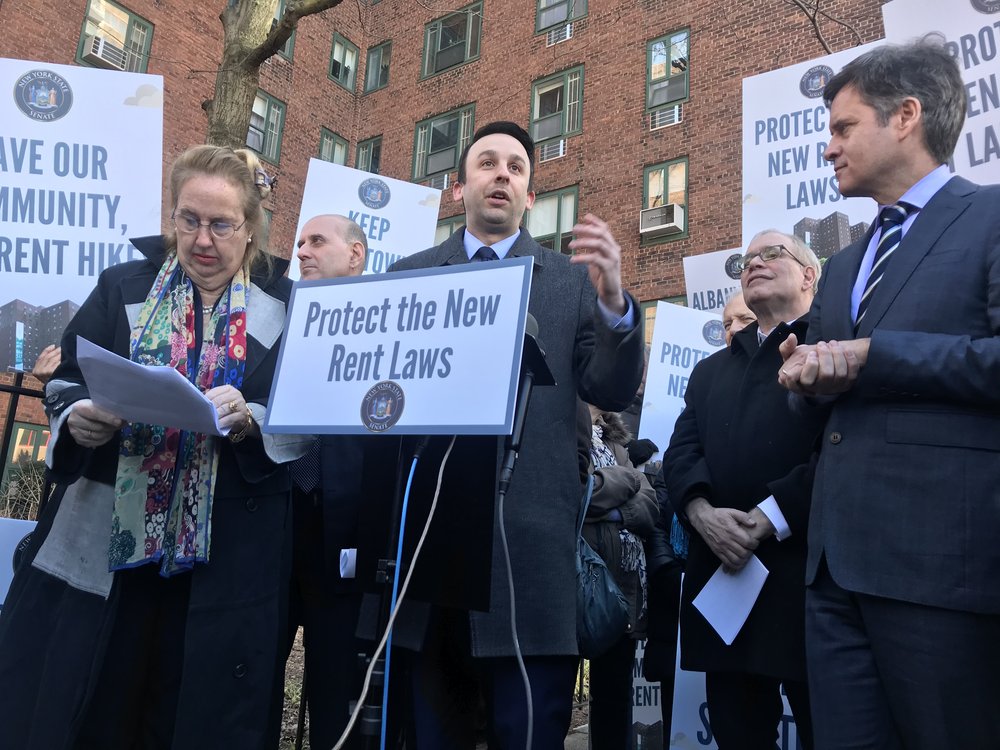Stuy Town Tenants Go To Court To Keep More Than 6,000 Apartments From Deregulation
March 5, 2020, 4:32 p.m.
A group of Stuyvesant Town tenants backed by local politicians say state-level rent reforms should keep their apartments rent-regulated.

In a lawsuit that could have broader implications for residential buildings receiving special city tax breaks, a group of tenants in Stuyvesant Town on Manhattan's east side are going to court to protect more than 6,000 apartments from possible deregulation.
About 6,200 rent-regulated apartments at Stuyvesant Town-Peter Cooper Village could face deregulation come July 1st after a tax break called J-51 sunsets for Blackstone Group. But the tenants, along with several local and citywide politicians, say sweeping rent reforms passed on a state-level last summer override the pending deregulation.
"The new law is clear and unambiguous," Susan Steinberg, the tenants' association president, said at a press conference outside of Stuy Town, a complex with some 11,200 apartments from 14th to 20th Streets along First Avenue built in the 1940s.
"Blackstone Group is of the opinion that these pro-tenant reforms do not apply to them. We disagree. They cannot disregard state rent law and raise rents and deregulate units as if the law had never been changed," she said.
The tenants' association, Steinberg, and five other tenants filed a lawsuit on Thursday in state Supreme Court against Blackstone, the city, the New York City Housing Development Corporation, as well as the New York State Homes and Community Renewal to call on a judge to determine whether the new state laws would indeed apply to the thousands of apartments at risk of deregulation, as they argue.
More than a decade ago, the previous owner of Stuy Town was found to have illegally raised rents before the tax breaks ended; the tax break and rent-regulation were extended to June 30th of this year under a 2012 settlement known as Roberts, which was reiterated in a 2015 agreement with the city. That 2015 agreement, which was touted by Mayor Bill de Blasio as preserving a middle-class oasis, also made the remaining 5,000 apartments in Stuy Town permanently affordable.
In court papers, the tenants allege the state rent reforms would prevent possible deregulation once the tax break ends this summer.
Blackstone maintained deregulation would be allowed this summer but welcomed the clarity a judge could offer.
"We are confident that the Court will reaffirm the 2012 Roberts settlement, which explicitly stated that these J-51 units should no longer be subject to rent regulation as of June 2020," Blackstone spokesperson Jennifer Friedman said in a statement.
Roberts apartments, which currently make up about 3,000 of the impacted apartments, average about $4,000 per month, more than twice the average of regulated apartments that average $1,800 in the development, according to Blackstone.
The city's Law Department did not immediately respond for comment. The state's New York State Homes and Community Renewal declined to comment on pending litigation, but said it continues to "prioritize the implementation" of the 2019 law.
State lawmakers said the Housing and Stability Tenant Protection Act written last summer is unambiguous.
"In Albany, we did something very clear," State Senator Brad Hoylman said. "We stated in the law that there is no expiration date on rent-stabilized housing."
One of the plaintiffs, Steven Newmark, said that after 13 years of living in Stuy Town, he never felt a sense of stability until those rent reforms were enacted.
"It was a feeling of relief," he said. "It was a feeling of knowing, 'Yes, I'm going to stay here.'"
"It's a very stressful thing not knowing what your housing situation is going to be like," he said. "Manhattan can't just be where you have public housing or housing for the ultra-wealthy. That's not a great future for our city."
Until a judge rules on the matter, Blackstone has agreed to not raise rents above percentages set by the Rent Guidelines Board while it is pending in court.
City Councilmember Keith Powers, who's family has lived in Stuy Town for generations, noted that what happens at Stuy Town could affect apartments under expiring J-51 tax breaks citywide.
"What happens here impacts people throughout the city," Powers said. "We've always been thinking about the big puzzle and how it all fits together, and this is one big piece of the puzzle because of the amount of tenants we're talking about here...At the end of the day, the laws now supersede and the tax break expiration is irrelevant."
UPDATE, 10:50 a.m. March 6th: The de Blasio administration, which was named as a plaintiff in the lawsuit, is now siding with Stuy Town tenants in their lawsuit.
In a statement to The Real Deal, an administration spokesperson said: "Rent reforms ushered in a new era for New York City tenants, providing greater security for families and strengthening neighborhoods. The terms of the earlier litigation make clear that these homes are subject to the stricter rent laws and tenant protections and they must remain under those protections."
The Law Department and City Hall did not immediately respond for comment.